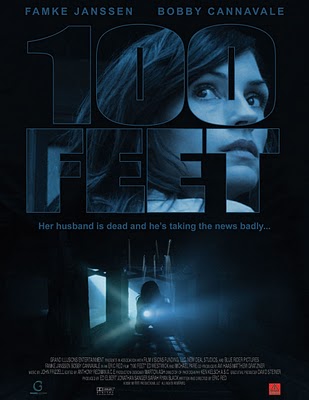
100 FEET
US, 2008, 96 minutes, Colour.
Famke Janssen, Bobby Cannavale, Ed Westwick, Michael Pare, Patricia Charbonneau, Kevin Geer.
Directed by Eric Red.
The title, 100 Feet, refers to the length on the ankle bracelet worn by Marnie Watson (played by Famke Janssen) who is sentenced to home detention for the killing of her husband. She is supervised by a hostile detective, partner of the dead man, played by Bobby Cannavale.
Marnie Watson has killed her husband, but he was an abusive husband and she killed him in self-defence, putting in complaints to the police who ignored them.
The film is not so much a character study of the wife, though there is some exploration of her character, her past, her relationship with her husband, with the watching policeman, with the young man who delivers groceries to her as well as to her bitter sister who resents her mother’s interest in her. The young boy is played by Ed Westwick.
However, the film is a haunting film. The ghost is present in the house, appearing in weird forms, being vindictive, brutalising his wife, brutalising the young grocery man. When the supervising detective becomes more sympathetic, he enters into the house, experiences the ghost and his threats as well, even to the setting of the apartment on fire. It is only when the wife throws her wedding ring at the ghost, that he disappears. Michael Pare appears as the ghost.
There is not much background explanation of why the ghost should be a ghost – but audiences will be happy to accept the facts and experience the haunting of the wife. The film was written and directed by Eric Red, best known for writing The Hitcher and Near Dark in the 1980s, writing other thrillers and directing such films as Cohen and Tate.
1. A horror film? A thriller? The combination?
2. The film restricted to the apartment, its interiors, upstairs, basement? The street outside? The parked car? The claustrophobic effect? The musical score and atmosphere?
3. The plausibility and implausibility of the plot? Marnie’s home detention? The police supervision? The ghost and his vengeance? The poltergeist-like activity? The resolution and the disappearance of the ghost?
4. Marnie, her first appearance, in the car, handcuffed? The technician putting on the ankle bracelet, his sympathetic approach? Shanks and his hostility, his friendship with Marnie’s husband, police partner? His not believing Marnie, his aggressive attitude towards her?
5. Marnie, within the house, settling down, cleaning, making a life for herself? The fright with the homeless man and the noise that he made, her ousting him? The mysterious sounds, appearances? The ghost of her husband? The weirdness of his appearance? The violence towards Marnie, hurtling her around the rooms?
6. Shanks, a growing sympathy, concern, believing her, checking on the complaints documents? His coming into the house, Marnie’s resentment towards him? His gradually being involved, the search for Joey? His experiencing the ghost?
7. The visit of Frances, the will, documents, the expressions of resentment against her sister? Her parents?
8. The visit of the priest, knowing Marnie in the past, his absolution for her confession? Her giving him the money she discovered that her corrupt husband had secreted? The priest’s unwillingness to help her any further?
9. Joey, sympathetic, bringing the groceries, talking? His own background, the police report? Wanting to arrest him? His attraction towards Marnie, spending the night with her? The violence wrought on him by the ghost? Her hiding the body, falling through the roof?
10. The build-up to the final confrontation, Shanks and Marnie, the virulence of the ghost, the fire in the apartment? Marnie throwing the ring at him, his disappearance?
11. Audience enjoyment of this kind of ghostly fantasy – with the anchoring in reality of the abused wife, the corrupt policeman?